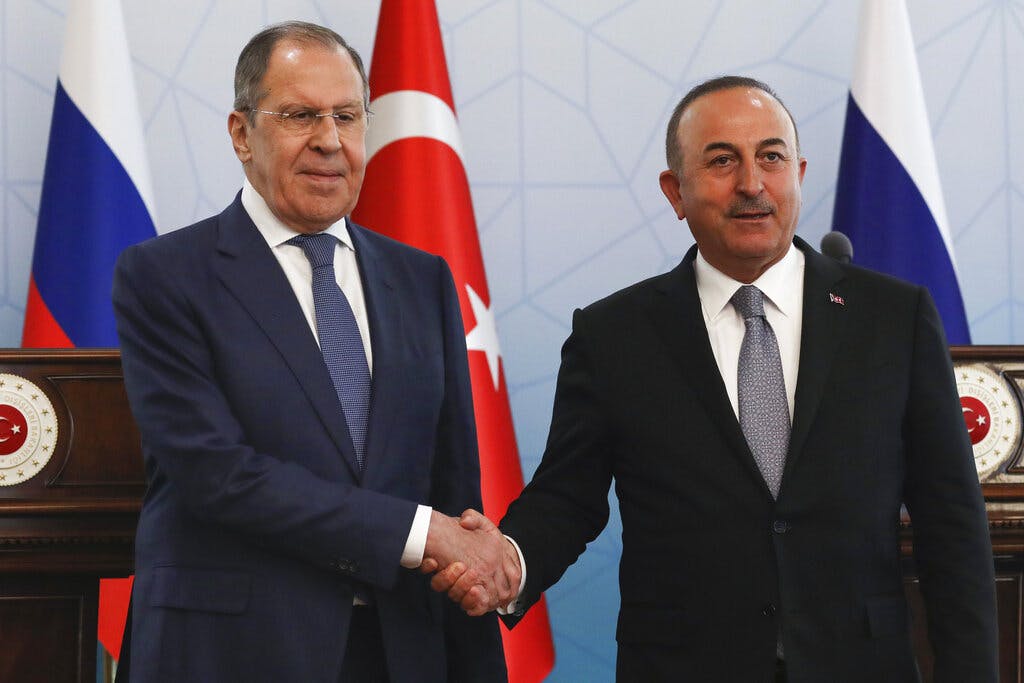Russian-Turkish Connivance on Ukraine Grain Gives Obscure Greek Port a Boost
Russia’s blockade of vital Ukrainian ports, chief among them Odessa, have underscored how the strategic fates and economic fortunes of many more countries than Russia and Turkey are intertwined.

The main takeaway from a recent meeting of the foreign ministers of Russia and Turkey, Sergey Lavrov and Mevlut Cavusoglu, is that there was nothing to take away — except the growing realization that there is likely some truth to Ukraine’s accusation that Russia has been selling contraband Ukrainian grain to Turkey. The glaringly inconclusive meeting between Messrs. Lavrov and Cavusoglu at Ankara earlier this month — ostensibly to facilitate the safe passage of merchant ships in the heavily mined Black Sea — has also served to raise the profile of a Greek port, Alexandroupoli.
Russia’s blockade of vital Ukrainian ports, chief among them Odessa, has underscored how the strategic fates and economic fortunes of many more countries than Russia and Turkey are intertwined. Much hinges on the Bosporus Strait, which flows past Istanbul and essentially connects the Black Sea to the Mediterranean Sea and the rest of the world. With commercial maritime traffic in the strait gridlocked and 25 million tons of Ukrainian grain caught up in Moscow’s war machinery, cue the urgency for efficient overland transport.
Bloomberg has reported that Ukraine has asked Europe for temporary grain storage for its upcoming harvest after Russia seized areas to the south and east and damaged silos, and President Biden said yesterday that Washington would help build some of those along Ukraine’s borders, including in Poland, “so we can transfer [grain] from those cars into those silos into cars in Europe and get it out into the ocean, and get it out across the world.” Yet that is taking time, he said, and shipping grain from the Black Sea is now off the table “because it’ll get blown out of the water” by the Russian blockade. Alexandroupoli, to probable Turkish chagrin, is also stepping up to the plate.
The Greek daily Kathimerini has reported that Ukraine wants to export not only wheat, corn, and sunflower seeds through Alexandroupoli, but also iron ore and glass, of which Ukraine is the top global producer. Situated in northern Greece, Alexandroupoli is the largest city in the Western Thrace region and was first settled as part of the Ottoman Empire in the 19th century, when it was a fishing village. It is only about 20 miles from the Turkish border as the crow flies; a bit further south is Turkey’s Gallipoli peninsula and the Dardanelles Strait.
Ukraine reportedly also seeks to import goods of mainly American and also East Asian provenance through the port. Rail connections through Bulgaria, Romania, and Moldova need some upgrading and the port authorities are looking to expand facilities, but for now the port can handle large wheat cargo ships.
The commercial as well as strategic profile of Alexandroupoli started to rise even before the Kremlin marched into Ukraine. In early December, the arrival there of the 1st Air Cavalry Brigade from Fort Hood in Texas en route to a Greek army base at Stefanovikio for a nine-month rotation marked the largest transfer of U.S. military equipment through Alexandroupoli up to that date. The former American ambassador to Athens, Geoffrey Pyatt, said at the time that “the ever-growing volume of military activity here at the Port of Alexandroupoli underscores this location’s expanding strategic role and importance for Greece, for the United States, and for the wider region.”
Prior to his appointment to Athens, Mr. Pyatt served as the eighth U.S. ambassador to Ukraine. While that may seem like a footnote, anything to do with the expanded role of an eastern-facing Greek sea port is being watched with a hawk’s eyes from Ankara. The Turkish president, Tayyip Erdogan, has in recent days ratcheted up bellicose rhetoric directed at Greece. While much of the hostility has to do with latent, if spurious, Turkish claims to some eastern Aegean islands that belong to Greece, Mr. Erdogan has also frowned on the growing U.S.-Greek strategic military partnership, even though both Greece and Turkey are members of NATO.
Washington and Athens signed a five-year defense pact in October 2021. Ahead of major military exercises along Turkey’s Aegean coast last week, Mr. Erdogan fumed, “There are nine U.S. bases [in Greece] right now. Against whom were they established? The answer they give is ‘against Russia.’ We don’t buy it, take no offense.”
Kyiv’s ambassador to Turkey, Vasyl Bodnar, said recently that Russia “is shamelessly stealing Ukrainian grains and getting them out from the invaded Crimea. These grains are being shipped to foreign countries, including Turkey.” Russia has predictably if unconvincingly rejected this, but Mr. Erdogan’s escalating anti-Greek bluster appears to have left no room for similar denials.
In the eastern Mediterranean in particular, that kind of silence is often enough of a signal for neighbors to adjust their strategic postures accordingly.

